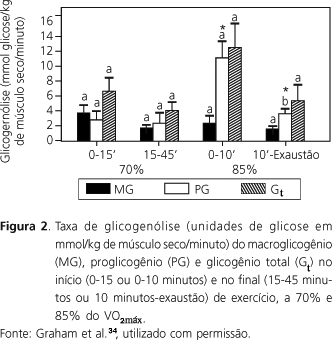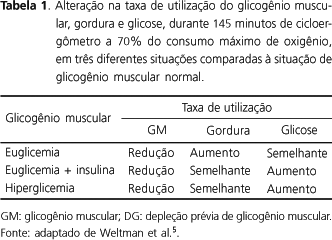A large number of studies have been conducted to understand muscle glycogen metabolism during exercise. Classical studies demonstrated a relationship between the pre-exercise muscle glycogen content and duration of exercise. Muscle glycogen declines in a semilogarithmic manner in function of time, but glycogen concentration does not reach zero, which suggests that other fatigue mechanisms participate in the interruption of prolonged exercise. In this type of activity, glycogen depletion occurs first in slow twitch fibers followed by fast twitch fibers. The decrease in the rate of muscle glycogen utilization is synchronized with an increased rate of fat uptake, but the physiological mechanism is not well understood. Recent studies suggest that the decline of insulin during exercise could be a limiting factor of glucose transport through the plasma membrane, which increases the uptake of fatty acids. Others studies have also demonstrated that the structure of muscle glycogen itself can regulate the cellular uptake of free fatty acids via protein kinase. Physically, the glycogen molecule has two forms, one with a smaller molecular structure (approximately 4.10(5) Da, proglycogen) and another one with a larger molecular structure (approximately 10(7) Da, macroglycogen). Apparently, the proglycogen form is more metabolically active during exercise and the macroglycogen form is more susceptible to increase with supercompensation diets. Higher concentrations of hypoxanthines and ammonia during exercise with muscle glycogen depletion have been reported, but studies that control exercise intensity better are necessary to help shed light on this issue.
muscle glycogen; hypoxanthines; insulin; metabolism; exercise



